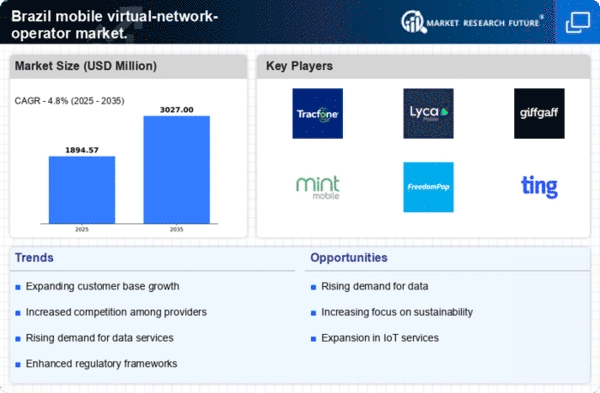Regulatory Support for Market Entry
Regulatory support significantly influences the mobile virtual-network-operator market in Brazil. The Brazilian government has implemented policies aimed at fostering competition within the telecommunications sector, which includes facilitating the entry of MVNOs. These regulations are designed to lower barriers to entry, allowing new players to emerge and compete with established operators. As a result, the mobile virtual-network-operator market is likely to see an influx of new entrants, which could lead to increased innovation and improved service offerings for consumers. This supportive regulatory environment is expected to enhance market dynamics and stimulate growth.
Growing Interest in Niche Market Segments
The mobile virtual-network-operator market in Brazil is witnessing a growing interest in niche market segments. MVNOs are increasingly targeting specific consumer groups, such as students, expatriates, and seniors, by offering tailored services that cater to their unique needs. This strategy allows MVNOs to differentiate themselves from traditional operators and capture market share in underserved segments. As of November 2025, it is estimated that niche-focused MVNOs could account for up to 15% of the overall market. The mobile virtual-network-operator market is thus likely to benefit from this trend, as it encourages innovation and the development of specialized offerings.
Rising Demand for Affordable Connectivity
The mobile virtual-network-operator market in Brazil experiences a notable surge in demand for affordable connectivity solutions. As the cost of living continues to rise, consumers increasingly seek budget-friendly mobile plans that offer essential services without excessive charges. This trend is particularly pronounced among lower-income demographics, who prioritize value for money. In 2025, it is estimated that approximately 40% of Brazilian consumers will opt for MVNOs due to their competitive pricing strategies. The mobile virtual-network-operator market is thus positioned to capitalize on this growing demand, potentially leading to increased market share and customer acquisition for MVNOs.
Shift Towards Digital-First Consumer Behavior
The shift towards digital-first consumer behavior is reshaping the mobile virtual-network-operator market in Brazil. As consumers increasingly rely on digital platforms for communication and entertainment, MVNOs are adapting their service offerings to meet these evolving preferences. In 2025, it is anticipated that over 60% of mobile users in Brazil will prefer digital channels for customer service and account management. This trend compels MVNOs to invest in digital tools and platforms, enhancing their customer engagement strategies. The mobile virtual-network-operator market must embrace this shift to remain relevant and competitive in a rapidly changing landscape.
Technological Advancements in Network Infrastructure
Technological advancements play a crucial role in shaping the mobile virtual-network-operator market in Brazil. The ongoing development of 5G technology and improvements in network infrastructure enable MVNOs to offer enhanced services, including faster data speeds and improved coverage. As of November 2025, it is projected that 5G penetration in Brazil will reach 25%, providing MVNOs with opportunities to attract tech-savvy consumers. The mobile virtual-network-operator market must adapt to these advancements to remain competitive, ensuring that they leverage new technologies to enhance service offerings and customer satisfaction.
















